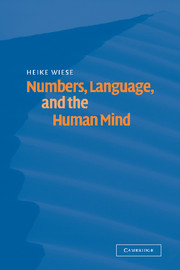Book contents
- Frontmatter
- Contents
- Acknowledgments
- Introduction
- 1 Numbers and objects
- 2 What does it mean to be a number?
- 3 Can words be numbers?
- 4 The language legacy
- 5 Children's route to number: from iconic representations to numerical thinking
- 6 The organisation of our cognitive number domain
- 7 Non-verbal number systems
- 8 Numbers in language: the grammatical integration of numerical tools
- Appendix 1 Number assignments
- Appendix 2 The philosophical background
- Appendix 3 Numerical tools: possible sets N
- Appendix 4 Conceptualisation of number assignments
- Appendix 5 Semantic representations for number word constructions
- References
- Index
2 - What does it mean to be a number?
Published online by Cambridge University Press: 22 September 2009
- Frontmatter
- Contents
- Acknowledgments
- Introduction
- 1 Numbers and objects
- 2 What does it mean to be a number?
- 3 Can words be numbers?
- 4 The language legacy
- 5 Children's route to number: from iconic representations to numerical thinking
- 6 The organisation of our cognitive number domain
- 7 Non-verbal number systems
- 8 Numbers in language: the grammatical integration of numerical tools
- Appendix 1 Number assignments
- Appendix 2 The philosophical background
- Appendix 3 Numerical tools: possible sets N
- Appendix 4 Conceptualisation of number assignments
- Appendix 5 Semantic representations for number word constructions
- References
- Index
Summary
In the previous chapter, we analysed the relationship between numbers and objects. We encountered numbers as efficient tools in different kinds of ‘measurements’, that is, tools that we assign to objects in a meaningful way in different contexts. Our discussion has identified the different purposes numbers fulfil in these contexts, and has shown us how we manage to employ them to tell us something about empirical properties. Now that we have an understanding of what we use numbers for, and how we do that, let us explore the philosophical background of our discussion and see what would be a good characterisation of numbers, in order to carve out the area in which our investigation will take place.
What does it mean to be a number? One of the earliest definitions of numbers that have been passed on to us is an analysis that the Greek mathematician Euclid gave in his ‘Elements’:
1. A unit is that by virtue of which each of the things that exist is called one.
2. A number is a multitude composed of units.
(Euclid, Book VII §§ 1–2)So, are numbers multitudes? What must a definition of numbers account for? Which characteristics distinguish numbers from other entities? At the end of the nineteenth and beginning of the twentieth centuries, these questions were discussed intensely in the philosophy of mathematics.
Information
- Type
- Chapter
- Information
- Numbers, Language, and the Human Mind , pp. 43 - 67Publisher: Cambridge University PressPrint publication year: 2003
